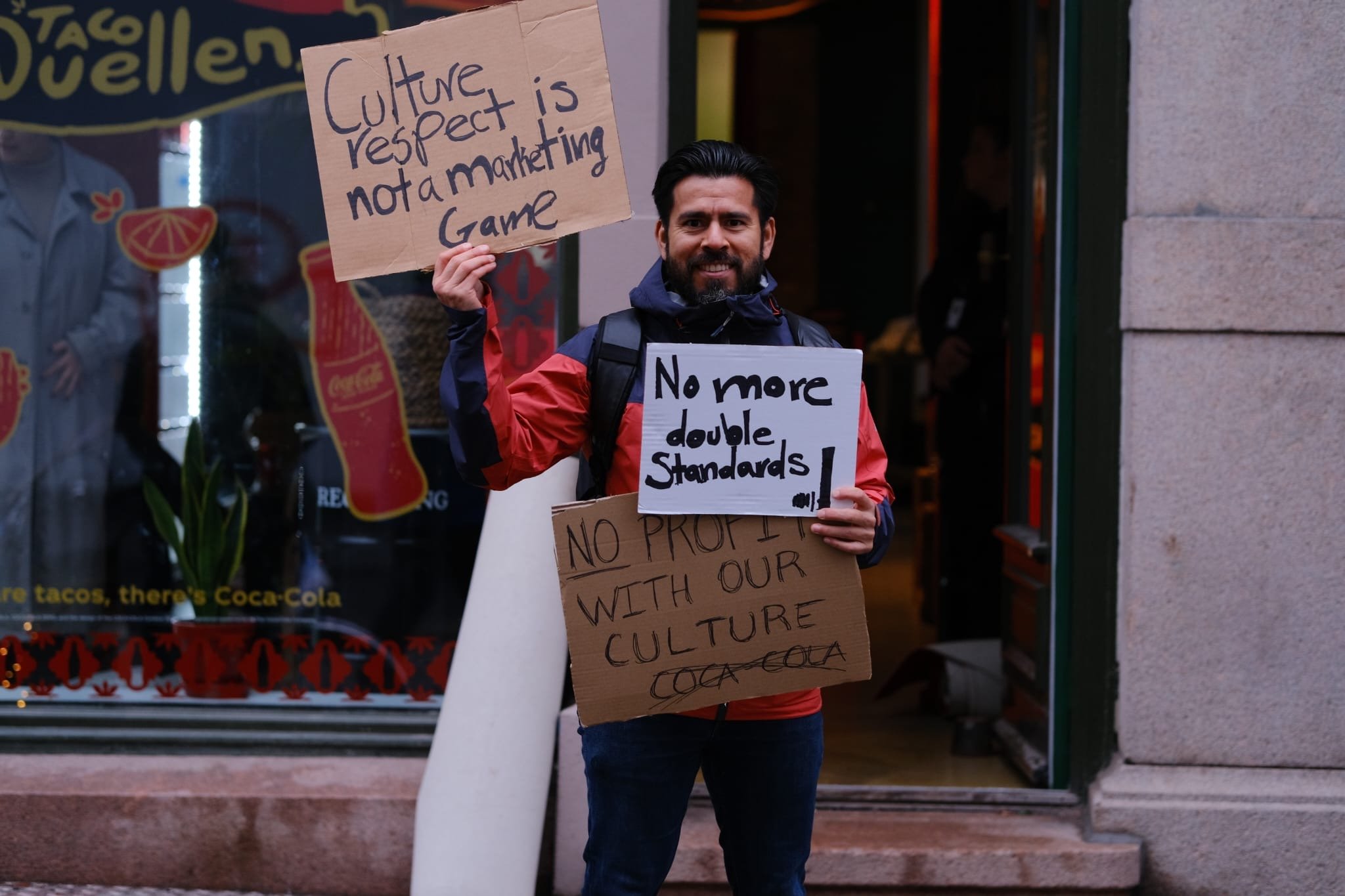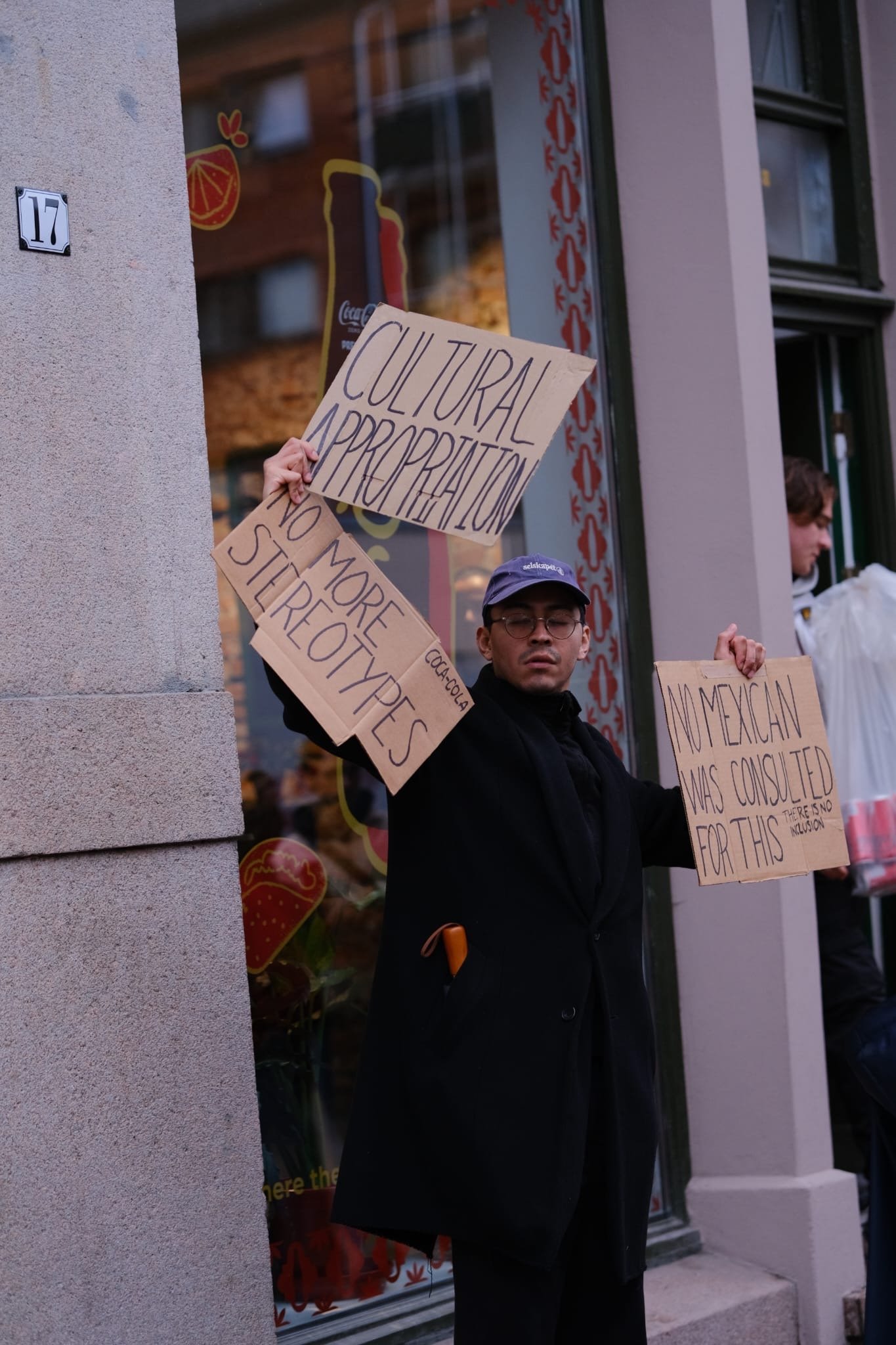Protest against cultural appropriation and the Coca-Cola “Taco Duellen” event
By David Camacho
October 22, 2024
Cultural exchange is a social phenomenon that is a consequence of a constant contact between different societies. The constant contact between two different societies results in the organic enrichment of the cultural elements that distinguish them. As such, the natural evolution of culture is the fusion of different customs that bring peace and community.
In the globalized world, borders and distances between societies are becoming shorter. Cultural contact between individuals becomes more constant and the consequences of it more evident. In general terms, there is nothing negative when exchange between societies that coexist emerges organically. However, also in the 21st century, there is a factor that modifies cultural relationships between individuals. This factor is the direct influence of transnational companies in the process of cultural exchange.
Photo by Oscar Rangel
We understand transnational companies as large companies that carry out their production, distribution and marketing activities of goods and services beyond the borders of the country of their founding. The impact of transnational companies on the cultural development of societies tends to be negative, since most of them do not conceive the local cultures as a social phenomenon, but as tools or functional elements in the strategies for promoting their products. In this sense, transnational companies act as a threat to the cultural principles of any community. Transnational companies, by prioritizing profit over cultural identity, modify the cultural traits of a society to make them more attractive to consumers and obtain more profits. These profits remain in the hands of the owners of the companies and never reach the hands of the members of the culture they exploit. We can say that, in this way, transnational companies promote cultural appropriation and prey on the traditions of societies to modify them at their convenience.
However, transnational companies with good management can be beneficial for cultures and the world. In general, transnational companies can serve as a good cultural export platform. This is only to the extent that the same society that rents the culture is included and intervenes, both in the profits and the marketing practices. This is to keep as pure as possible the traditions that are intended to be exported and to prevent transnational companies from appropriating their most characteristic cultural features.
Photo by Oscar Rangel
It is undeniable that today the customs of a country cannot be preserved perpetually, since culture tends to evolve regardless of the desire for preservation. However, it is important to emphasize that the result of the evolution of society will always be a function of the participation of its members.
Today, the Mexican community in Norway emphasizes the defense of our culture against Coca-Cola's attempts at cultural appropriation. In recent weeks, Coca-Cola generated a strong marketing campaign promoting “authentic” Mexican street food. Tacos in street stalls were the proposal. The company took as its own, a Mexican cultural tradition that emerged, not because of fashion, but because of the search for opportunities to survive.
Street taquerias are not a “new” invention of gastronomic fashion, but rather the only alternative that some Mexicans have to survive.
Faced with this situation, we have raised our voice against Coca-Cola for the attempted cultural appropriation and against the export of stereotypes that damage the image of Mexican society.
Street taquerias are not a “new” invention of gastronomic fashion, but rather the only alternative that some Mexicans have to survive.
Photo by Oscar Rangel
We say this because we are fed up that Mexican culture is seen in the eyes of foreigners, especially the Norwegian community, as only food and alcohol. With the proclamation “Mexico is more than tacos/Mexico er mer enn tacoene”, we want to emphasize the importance that the Mexican community has in the world and, above all, in Norway.
We seek seriousness in the treatment of our culture, because Mexico must rise up to demand respect. Mexico is a land of hard-working, serious and dedicated people. Great contributions of Mexicans to the world have changed the development of history. From the invention of color television (by Guillermo González Camarena) to the creation of the contraceptive pill, in 1951, our land has been home to people who have changed the world.
I mention these examples, since the cultural export and appropriation that transnational companies, such as Coca-Cola, and the Hollywood film industry, have damaged the image of Mexicans. We see this damage reflected in the perspective that the world has of us, to such a degree that we are often not taken seriously and that closes many doors for our adaptation and development, not only in the world, but in this country. Mexicans are not only tacos, tequila and siesta. We are not what Hollywood movies show you. We are not lazy and much less disinterested. We are hard-working people who can adapt to any environment, including the hostility of Scandinavian lack of hospitality.
Mostly because tacos and Mexican food in general, are Intangible Heritage of Humanity, declared by the United Nations Educational, Scientific and Cultural Organization (UNESCO), since November 2010.
We emphasize that we are not closed to sharing our traditions, but we do seek to prevent transnational companies from dictating how our culture should develop. I mention this, since in the Coca-Cola “Taco-duellen” campaign, the Mexican community contacted the organizing members of the event. In this contact, we offered to help culturally guide the event, but the only response we got was “we will give you free products”. It is important to mention that there is not a single Mexican at the organization of the event and the preparation of the dishes does not have any Mexican characteristics, even though the event's slogan dictates “authentically Mexican.”
We don't want your Coca-Colas. We want respect for our individuals and our culture. Mostly because tacos and Mexican food in general, are Intangible Heritage of Humanity, declared by the United Nations Educational, Scientific and Cultural Organization (UNESCO), since November 2010.
In this sense, I point out the abuse of the double standard that exists in Norwegian society. On the one hand, they proclaim in their discourse that they are progressive and advocate integration, but that sentiment is far removed from reality.
This protest emanates from Mexican culture, but also involves all other cultures in Norway and the world that are displaced or commodified for the benefit of a certain group.
We do not seek to monopolize our culture, but rather to be included. Such as we requested when we got in contact with the organizers of the event. We Mexicans are very open to receiving anyone who is interested in our traditions and ways of seeing life. However, we are aware of the impact that one perspective has on the appreciation of a culture. For this reason, we defend our traditions from transnational companies that seek to profit from them. Furthermore, we want to show that Mexicans are more than tequila and tacos. We are organized individuals who have the ability to raise our voices against the big companies and to be the spokesperson for those who are not heard.
Greetings and thanks.





